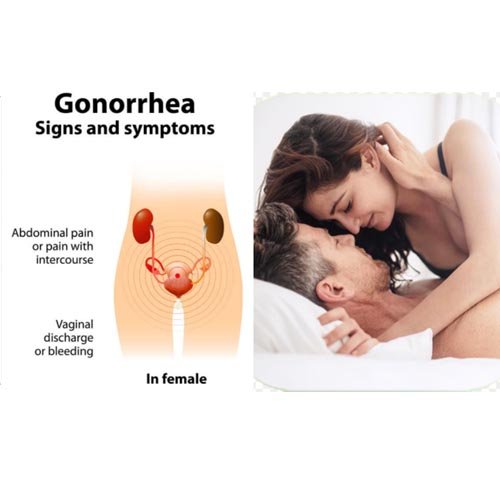Sexually active people can easily be infected by Gonorrhea; gonorrhea symptoms can cause serious complications if it is not treated on time, and correct medication can easily cured gonorrhea disease. A question often asked what gonorrhea is, and it is sexually transmitted contagious disease, which can affect both men and women.
Gonorrhea infection can blight the rectum, genital, and throat areas and mostly seen in young ages from 16 years to 25. Sexually active people practicing unprotected sex can transmit the gonorrhea bacterium Neisseria gonorrhea by body fluid. Normally symptoms of gonorrhea are massive burning during passing the urination, and penile discharge in men, women symptoms of gonorrhea are pelvic pain and vaginal discharge, if gonorrhea is not treated. It can further cause pelvic inflammatory disease and epididymitis, which can affect the joints and heart valves.
How Gonorrhea Spread?
Gonorrhea can be easily spread because of highly contagious disease from vaginal, oral, and anal sex to another sex partner who has active bacterium of gonorrhea. A pregnant woman is at serious risk if she carries the gonococcal infection because at a time of labor, infection can be transmitting to the baby as well.
- Vaginal or anal sex with an infected partner
- Oral sex, although chances are less
- Sharing sex toys highly at risk
- Touching parts of the body with fingers
- Close physical contact
- Bacteria can be passed from hand to hand, but chances are less
- Mother to her baby at birth
How to Prevent Gonorrhea?
Gonorrhea can be prevented only if you are not involved in sexual activities. If you are an active sex personality like anal, vaginal, or oral sex, then the probability of STD gonorrhea cannot be prevented. Eventually, sexually active people can reduce the chances of gonorrhea by using the health care guideline, such as long term sexual relations with one partner who has tested STD with negative results and the use of a condom.
What are the Causes of Gonorrhea?
Gonorrhea is a very common sexual disease noticed in US health clinics, and causes of gonorrhea are Gonorrhea Neisseria bacteria; sexual contact is the cause of transmitting of infection. And bacterium grows in mucous membranes of the body and multiple in rapid phase, also develop in the warms, moist areas of the reproductive track which includes the cervix, fallopian and urethra in both men and women.
Research shows that men have exposed a 20% risk of getting gonorrhea infection involved sex behavior with infected women, but the risk of sex with men to men is very high. On the other part if women make a vaginal relationship with infected men is at higher risk from 60% to 80% to be infected gonorrhea Neisseria bacteria.
How Do You Know About Gonorrhea?
If you are infected with gonorrhea, it may be no symptoms at all. Later on, symptoms can be appearing within ten days to 30 days after the exposure.
What are the Symptoms of Gonorrhea?
Symptoms of gonorrhea are very painful in both men and women; half of the women are without symptoms, while virginal discharge, painful urination, lower abdominal pain, and sex with pain are common.
Gonorrhea Symptom in Men
- Yellow or whitish release from the penis
- Burning during urinating
- Burning in the throat (because of oral sex)
- Painful or swollen testicles
- Swollen glands in the throat
Gonorrhea Symptom in Women
- Yellow or whitish discharge from the vagina
- Lower abdominal pain
- Burning during urinating
- Conjunctivitis (red, itchy eyes)
- Bleeding during periods
- Spying after intercourse
- Swelling of the vulva
- Burning in the throat (because of oral sex)
- Swollen glands in the throat
How to Diagnose the Gonorrhea?
If you feel any symptoms of gonorrhea, visit your healthcare clinic where the doctor will diagnose the gonorrhea symptoms by using the swab a sample of liquid fluid from the urethra in men or cervix in women. The specimen will be sent to the lab for analyzing the bacterium of gonorrhea. If a doctor identifies infection in throat areas, then anal culture is required for testing. A urine sample is also one method to test the gonorrhea bacterium, and after some days, the lab will send the results if active or not.
What is Management & How to Treat Gonorrhea?
In recent times gonorrhea bacteria has created resistance against antibiotics; however, injectable high dose of ceftriaxone is affected by the treatment of gonorrhea infection.
Oral antibiotics such as levofloxacin combination of doxycycline are also given to cure gonorrhea & chlamydia. Doctors no more prescribe increasing resistance against antibiotics such as fluoroquinolones, penicillin, tetracycline, and cefixime.
It is not prescribed for you to treat gonorrhea himself; you must visit the doctor who will diagnose the symptoms and recommend the medication. This information is only for reading and awareness purposes and not trigging anyone to use any medical prescription by reading this article.









[…] bacteria known as Neisseria gonorrhoeae causes the gonorrhea STD. The gonorrhea STD treatment for its cure is done through antibiotics such […]